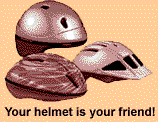Neuroscience For Kids
Brain Fitness
You are born with just about all the neurons (nerve cells) that your brain will ever have*. Damaged brains are NOT easy to fix. Here are some suggestions for good brain health.
 1. Wear your seat
belt!
1. Wear your seat
belt!
In a car, truck or airplane, your seat belt will help protect your head and brain from injury. Motor vehicle accidents are by far the greatest causes of brain injuries, accounting for 37-50% of all brain injuries. (Statistic from Amer. J. of Diseases of Children, Vol. 144, pages 627-646, 1990 and Brain Injury Association USA)
![]()
 2. Wear
your helmet! Whether you are biking, skating or
skateboarding, your helmet will protect your head if you fall. Make
sure that your helmet meets or exceeds the American National Standards
Institute (ANSI) and Snell Memorial Foundation standards for safety.
2. Wear
your helmet! Whether you are biking, skating or
skateboarding, your helmet will protect your head if you fall. Make
sure that your helmet meets or exceeds the American National Standards
Institute (ANSI) and Snell Memorial Foundation standards for safety.
Head injury is the most common cause of death in bicycle crashes accounting for 62% of all bicycle-related deaths. (Statistic from Morbidity and Mortality Weekly Report, Vol. 44, No. RR-1, pages 1-17, 1995)
More information about bicycle injury.
![]()
 3. Stay
away from illegal drugs! Drugs alter brain
function - no question about that. Although damage done by some
drugs can be reversed, some drugs may change brain function permanently.
Why take the chance?
3. Stay
away from illegal drugs! Drugs alter brain
function - no question about that. Although damage done by some
drugs can be reversed, some drugs may change brain function permanently.
Why take the chance?
![]()
 4. Know
the risks involved with sports! This applies mainly to boxing, football
and the martial arts. However, even soccer,
climbing, horseback riding, diving and skiing have risks. Always wear
your safety equipment properly and be in good physical condition for
your sport. In the United States in 1987 and 1988, 92,763 emergency
room visits were made for injuries related to horseback riding. 18.9%
of these visits were made due to injuries to the head and neck.
(Statistic from Morbidity and Mortality Weekly Report, Vol. 39,
no. 20, pages 329-332, 1990)
4. Know
the risks involved with sports! This applies mainly to boxing, football
and the martial arts. However, even soccer,
climbing, horseback riding, diving and skiing have risks. Always wear
your safety equipment properly and be in good physical condition for
your sport. In the United States in 1987 and 1988, 92,763 emergency
room visits were made for injuries related to horseback riding. 18.9%
of these visits were made due to injuries to the head and neck.
(Statistic from Morbidity and Mortality Weekly Report, Vol. 39,
no. 20, pages 329-332, 1990)
Did you know? Each year there are about 300,000 brain concussions that occur during sports activities. (Source: Center for Disease Control.
![]()
 5. Look
before you leap! I know it sounds impossible, but people
DO dive into swimming pools without water. Dive only in the deep end of
the pool and make sure that the water in the lake and at the beach is
deep enough to dive in head first. Also, be aware of any objects, such
as large rocks, that may be hidden under the water. There are up to
1,000 spinal cord injuries each year in the United States when people
dive into swimming pools or other bodies of water - (Statistic from
Morbidity and Mortality Weekly Report, Vol. 37, no. 30, pages
453-454, 1988)
5. Look
before you leap! I know it sounds impossible, but people
DO dive into swimming pools without water. Dive only in the deep end of
the pool and make sure that the water in the lake and at the beach is
deep enough to dive in head first. Also, be aware of any objects, such
as large rocks, that may be hidden under the water. There are up to
1,000 spinal cord injuries each year in the United States when people
dive into swimming pools or other bodies of water - (Statistic from
Morbidity and Mortality Weekly Report, Vol. 37, no. 30, pages
453-454, 1988)
![]()
 6. Look
both ways before crossing
the street!. I know that you have heard this one before, but
accidents do happen and you can't be wearing your helmet all the
time.
6. Look
both ways before crossing
the street!. I know that you have heard this one before, but
accidents do happen and you can't be wearing your helmet all the
time.
![]()
 7. Stay
away from guns! I don't think I have to explain this
one. Firearms were the second leading cause of injury-related deaths in 2002.
A total of 30,242 firearm-related deaths were reported in the United
States in 2002. (Statistic from Centers for Disease
Control and Prevention)
7. Stay
away from guns! I don't think I have to explain this
one. Firearms were the second leading cause of injury-related deaths in 2002.
A total of 30,242 firearm-related deaths were reported in the United
States in 2002. (Statistic from Centers for Disease
Control and Prevention)
![]()
 8. Make
sure you have a "good" surface around your playground equipment! Just in
case you fall off of a climber, a soft
impact-absorbing surface will cushion your drop. In the United States
from 1983-1987, 66.5% of the school playground-related injuries involved
the head and neck.(Statistic from Morbidity and Mortality Weekly
Report, Vol. 37, no. 41, pages 629-632, 1988). National Program for Playground
Safety.
8. Make
sure you have a "good" surface around your playground equipment! Just in
case you fall off of a climber, a soft
impact-absorbing surface will cushion your drop. In the United States
from 1983-1987, 66.5% of the school playground-related injuries involved
the head and neck.(Statistic from Morbidity and Mortality Weekly
Report, Vol. 37, no. 41, pages 629-632, 1988). National Program for Playground
Safety.
![]()
 9. Eat
right! Your brain needs energy to work its
best.
9. Eat
right! Your brain needs energy to work its
best.
![]()
 10. Dispose
of chemicals properly! Many chemicals, such as pesticides
and cleaners, contain neurotoxins that can kill nerve cells and damage
nerves. These dangerous chemicals can be found in your home or at
places of work. Dispose of these materials
properly!
10. Dispose
of chemicals properly! Many chemicals, such as pesticides
and cleaners, contain neurotoxins that can kill nerve cells and damage
nerves. These dangerous chemicals can be found in your home or at
places of work. Dispose of these materials
properly!
Did you know? Each year in the United States, there are about 52,000 deaths caused by traumatic brain injury. This statistic from the Center for Disease Control.
*Note: Other data suggest that new neurons DO grow in the brain after birth. This has been demonstrated in rats, tree shrews, marmosets, monkeys and humans.
 For more about brain injury and protecting your head, see:
For more about brain injury and protecting your head, see:
- Bicycle Helmet Effectiveness (large file - 150k)
- Bicycle Helmet Safety Institute
- Brain Injury: Prevention
- Consumer's Guide to Bicycle Helmets
- Help in Planning a Helmet Promotion Program
- Think First Oregon
- TBI Help Desk
For information about spinal cord injury, see the National Spinal Cord Injury Association.
Copyright © 1996-2021, Eric H. Chudler All Rights Reserved.
